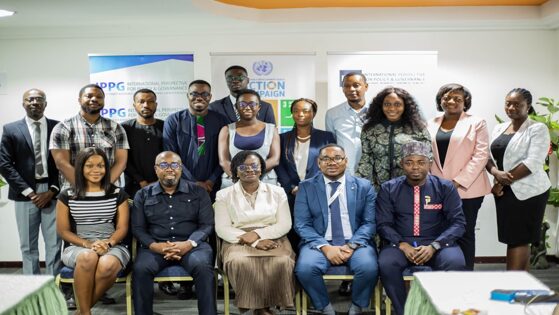Ghana’s rapidly expanding digital economy is set to drive future economic growth, according to business and trade experts who gathered for a roundtable discussion in Accra on October 8, 2024.
The event, organised by the International Perspective for Policy and Governance (IPPG), was held under the theme, 'Navigating the Current Business Environment in Ghana: Impacts on Foreign Trade and Opportunities for International Collaboration.'
The discussion brought together experts from foreign missions, chambers of commerce and industries, and state agencies to examine the effects of the evolving business landscape in Ghana and discuss ways to enhance cross-border trade and partnerships.
Digital Economy: Ghana’s Next Frontier for Growth
While recognizing the importance of traditional sectors like agriculture, mining, and manufacturing to Ghana's economy and trade revenues, participants at the roundtable acknowledged the growing impact of the services sector. ICT, e-commerce, and fintech have become driving forces behind Ghana's post-COVID-19 economic recovery. Businesses offering software solutions, digital platforms, and e-commerce services have thrived in recent years, showing resilience even during the country’s economic downturns, which indicate their potential for job creation and economic stability. They also present new opportunities for innovation and global market accessibility, according to the experts.
Investment Climate and Policy Challenges
Although the services sector has demonstrated robust growth and potential, the roundtable participants warned that outdated regulations and cumbersome processes continue to stifle innovation and foreign investments in Ghana. Regulatory bottlenecks in sectors like IT, manufacturing, and trade were cited as major barriers to progress. According to the experts, these issues have led some companies to explore alternative markets, such as Ivory Coast, where entry requirements are more predictable and less restrictive.
Additionally, recent changes in the Energy Commission’s electricity bulk customer category have raised concerns among businesses, as the changes affect their cost structures and investment decisions. Despite these hurdles, it came to fore that Ghana’s Free Zones Authority continues to provide incentives for businesses to make the country an attractive destination for foreign investment. These incentives, along with infrastructural developments in the free zone areas, have allowed businesses in sectors such as pharmaceuticals, manufacturing, and services to flourish.
The participants called on policymakers to streamline regulatory frameworks to create a more investor-friendly and predictable environment that supports both traditional and emerging sectors to ensure balanced and sustainable growth across the country’s economy. Encouraging value-added manufacturing processes and service-oriented exports were seen as essential in this effort. The consensus among the experts was that streamlining regulatory frameworks could stimulate further growth, investments, and innovation to make Ghana more competitive on the global stage.
Human Capital Development
Another key issue addressed during the roundtable meeting was the urgent need for Ghana to develop a skilled workforce to meet the demands of emerging industries. The experts emphasized the importance of investing in education and vocational training programs, particularly in technology and services, while also building capacity in the manufacturing sector.
It was also recommended that the government create incentives to foster partnerships between businesses and educational institutions, which would enhance practical training opportunities and better align skills with industry needs. As digital trade, e-commerce, and IT continue to grow globally, Ghana’s ability to produce a tech-savvy workforce will be critical to sustaining economic growth and attracting high-value investments.
Strategic Partnerships and International Collaboration
Strategic partnerships between Ghanaian businesses and international companies are essential to sustaining the country’s economic momentum. Sectors such as the pharmaceutical industry have benefitted from collaborations that allowed the transfer of knowledge, technology, and resources.
The experts emphasized that the future of Ghana’s economy depends on its ability to engage globally and capitalize on its strengths in both traditional and emerging industries. Ghana must utilize its diplomatic relations to strengthen business ties with global partners, attract investments, and stimulate innovation across sectors.
Ghana’s Competitive Advantage and Path Forward
Ghana’s peace and stability, coupled with its strategic location within West Africa offers a competitive edge, particularly in comparison to neighboring countries facing political and economic instability. However, to fully capitalize on this advantage, the roundtable participants agreed that bold reforms, innovative strategies, and a forward-looking policy approaches would be required to prepare the country to thrive in both traditional and emerging economic sectors.
Importantly, the experts advocated for a national development plan that transcends political changes to ensure policy continuity and economic growth and stability.
The detailed discussions and recommendations from the roundtable meeting will be incorporated in the final publication of an upcoming IPPG report titled “Ghana’s Economic Outlook: Opportunities and Challenges in Trade and Policy”.
Latest Stories
-
Sinner considered quitting during doping case
4 hours -
BoG is not injecting significant amount of dollars to support cedis stability – Dr Johnson Asiama
4 hours -
Court remands four into NACOC’s custody for alleged cocaine smuggling
4 hours -
Warmest day of year as UK temperature hits 24.9C
4 hours -
David Ofosu-Dorte challenges VRA to ignite Ghana’s industrial future
5 hours -
Sahel Confederation hails Morocco’s non-interference and economic lifeline
5 hours -
Man accused of double murder admits killing one man
5 hours -
Stop the drama and tell the truth about NSS ghost names scandal – AG dares A Plus
5 hours -
A Plus’ threat laughable, I have nothing to hide – AG
6 hours -
Pan-African business forum announces new senior appointments
6 hours -
Is the NPP struggling to hold the NDC accountable in its first 120 days? – Prof. Boadi
6 hours -
AG to file criminal charges in Sky Train, NSS ‘ghost names’ scandals next week
6 hours -
Australia-Africa Partnership for Climate-Responsive Agriculture: A $76m investment
6 hours -
Exam malpractices threaten national security, workforce competitiveness – WAEC
6 hours -
Fear grips residents of Akatakyieso after ‘unauthorised’ taskforce invaded mining firm, assaulted workers, stole gold bars
7 hours

